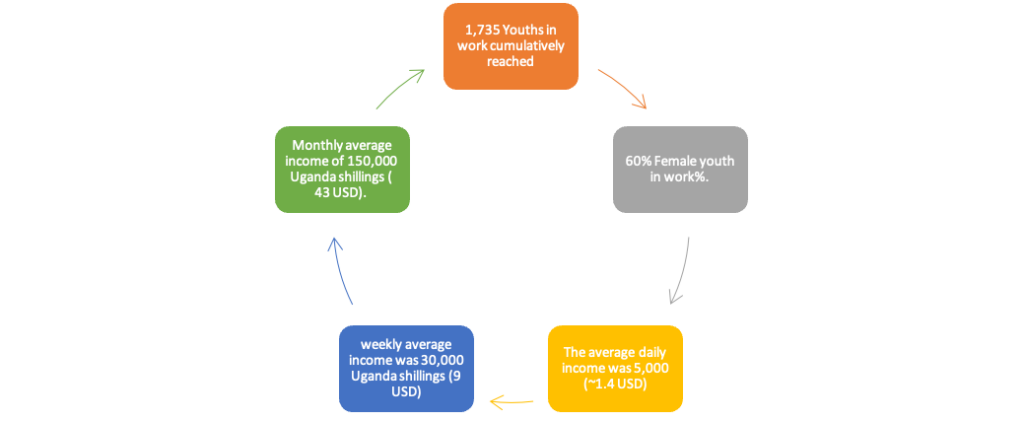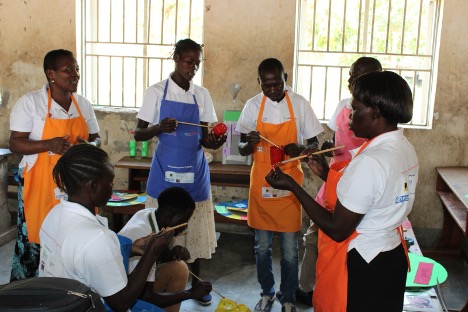Programmes
a). BRIDGE: FROM SECONDARY EDUCATION AND SKILLS DEVELOPMENT TO JOB OPPORTUNITIES FOR REFUGEE AND HOST COMMUNITY YOUTH IN UGANDA
The project is funded by the Mastercard Foundation for Increased access to market-relevant secondary and tertiary education and skills for refugee and host community youths of Nakivale, Rwamwnja,and Kyangwali. To date, a cumulative total of 7,698 youth has been skilled throughout the project, out of a targeted outreach of 18,169 with 62% females and 68% refugees placing the project outreach progress at approximately 24%. The outreach total is majorly a contribution of in-school Menstrual Hygiene Management and Sexual & Reproductive health trainings with 36% participants of the total outreach.

Figure 1 Youth on apprenticeship learning motor cycle repair
Overall, 1033 Youths have transitioned to work representing approximately 24% of the total outreach
Figure 1 Youth on apprenticeship learning motor cycle repair
ELECU continues to providing skilling opportunities to young people through 5 pathways;
- Conducting in school workshops on menstrual hygiene management and on sexual and reproductive health for 2452 AEP learners, teachers, and Youth Education Committees (YECs).
- Providing continuous mentorship, advice, and support to 81 youth enterprises comprising of 5 members per youth led business using the i-Upshift methodology
- Supporting 1420 young people apprenticeships for on the job/work-based learning and through business-to-business mentorship
- Training 1067 out of school refugee and host community youth to access 2month market-oriented trainings in partnership with, local artisans and business people.
- Supported and equipped 6 youth-led business support centers to skill 2167 youths.
- Providing linkage to 185 youth to financial institutions like Equity bank that provide low interest rates on borrowings made by young people

As a result of these skilling pathways, ELECU has supported to so far 1735 young people to find work that provides them with an average monthly income of UGX. 150,000 ($43). This is helping youth engage in productive but also improving livelihoods for their families.
b) SKILLING DEAF YOUTH PROJECT
In partnership with Wilde Ganzen, Vandoorn Foundation and Pacer Community Polytechnic, the project is expected to create opportunities for deaf youth in Pakwach district to become self-reliant through vocational skills and entrepreneurship training at Pacer Polytechnic.
ELECU supported the training of 45 deaf youth to acquire tailoring skills. the youth undertook and 6weeks training in tailoring. Further the instructors were trained and acquired skills in training children with disabilities at the polytechnic. The project is expected to create opportunities for deaf youth in Pakwach district to become self-reliant through vocational skills and entrepreneurship training at Pacer Polytechnic.

c) PLAYMATTERS – SPARKING LIFE LONG LEARNING THROUGH PLAY PROJECT
ELECU in partnership with the International Rescue Committee (IRC) and Lego Foundation is implementing the Play Matters – Sparking Life Long Learning through Play program. The program’s aim is to improve holistic learning and wellbeing outcomes for refugee and host community children (ages 3-12+) in Uganda, targeting 16 Primary schools and 4 ECD centres in Madi Okollo district and Rhino settlement.
Through this project, we have so far supported 15,872 Learners to access education opportunities and 145 Teachers to teach effectively using Learning through Play methodology across 7 Primary schools and 3 ECD Centers in Rhino Camp Settlement, Madi Okollo District. The schools that benefit through direct support provision in Rhino camp were; Eden, Wanyange, Olujobu, Tika, Emvenga, Rigbo PS, and Kaligo and 3 Pre-primary schools of Eden 4 ECD, Tika 4 ECD and Wanyange ECD.
ELECU pays stipends to 11 ECD caregivers from Eden 4 ECD, Tika 4 ECD, and Wanyange ECD under the PlayMatters project. This is incentivizing all 10 caregivers to remain in the profession and at the ECD centers, which is resulting in enhanced quality of instruction and ultimately improving access to quality basic education by ensuring consistent and competent teaching staff. This investment in teachers is fostering a positive learning environment, which is essential for learner engagement and academic success.
Additionally, ELECU has rehabilitated 20 classroom chalkboards across seven primary schools and three ECD centers within Rhino Camp settlement. This initiative is fostering a conducive learning environment for learner engagement and academic excellence. More to that, at Tika 4 ECD, one classroom block was rehabilitated, establishing a positive ambiance for teaching and learning. This transformation is attracting more learners, thereby ensuring equitable access to quality education.

In furtherance of our commitment to advancement of teacher effectiveness in pedagogy, a total of 11 Early Childhood Development (ECD) caregivers have been trained in the production of low or no-cost materials to augment teaching and learning practices within Rhino Camp settlement. Equipping caregivers with the skills to create their own teaching aids using readily available and affordable materials, has fostered a culture of creativity, resourcefulness, and adaptability within the classroom setting. As a result, caregivers producing and utilizing in teaching tailored instructional resources to suit the unique needs of their learners and curriculum, which has overcome resource constraints.
Significantly, ELECU has engaged 1,874 parents and community members during door-to-door “Go Back to School” campaigns. Spearheaded by 131 community leaders in Rhino Camp settlement and Rigbo host community, these campaigns have led to a noteworthy surge in student enrollment across 10 partner schools in Madi Okollo District, with figures rising from 13,926 in term 1 to 15,872 by term 3 of 2023
d) GENDER RESPONSIVE EDUCATION AND CHILD PROTECTION IN THE REFUGEE AND HOST COMMUNITIES IN WEST NILE (GREP-WN)
ELECU in partnership with Plan International Uganda is implementing the Gender Responsive Education and Child Protection project in the Refugee and Host Communities in West Nile (GREP-WN) in West Nile (GREP-WN). This 3-year project is implemented with funding from Education Cannot Wait (ECW) under the MYRP II funding window in 8 primary schools of Knowledge land, Kado, Abiriamajo, Oluba P/S, Nipata, Highland, Iyete, and Geya in Yumbe District, Bidibidi settlement zone IV.
Under this project, ELECU distributed Menstrual Hygiene Management (MHM) kits to more than 2,552 girls across various schools which has improved retention and enrolment of the girl child in underserved communities. These schools include Abiriamajo, Nipata, Highland, Oluba, Kado, Knowledge Land, Geya, and Iyete Primary Schools in the Bidibidi refugee settlement. The MHM kits comprises of reusable pads, soap, underwear, and buckets, ensuring that the girls access essential hygiene materials which is improving attendance and retention rates for adolescent girls.
Additionally, 28 focal teacher persons have been trained as Girls’ Education Movement (GEM) patrons and Matrons to support GEM clubs. These Girls’ Education Movement (GEM) are a young people’s movement aimed at mobilizing children and young people in and out of school in the promotion of girls’ education. They contribute to girls’ and young women’s agency from the perspective of investing in their presence, active participation, leadership and contribution in all project activities such as: back to school campaigns, creating safe spaces to support their empowerment: allowing them to explore who they are, learn, try new behaviors in a trusting environment, and help build their confidence and self-esteem and efficacy; and ensuring the inclusion, consideration of needs, and equal access to information of girls in all their diversity.
Furthermore, within our GREP-WN project, 127 school community stakeholders have been consulted and trained on mapping and identification of child protection mechanisms across eight school communities in Zone IV. This intervention has continued to fortify child protection referral pathways and implement school-based strategies to tackle issues such as bullying, violence, and Mental Health and Psychosocial Support.
e) COMPREHENSIVE PRIMARY EDUCATION FOR REFUGEE GIRLS AND BOYS
The Comprehensive Primary Education for Refugee girls and boys project was a 12 months’ project funded by Street Child in partnership with Education Cannot Wait under the Fast Emergency Response funding mechanism. The Fast Emergency Response (FER) window responded to the most immediate and urgent education needs of school age going children as crises suddenly occur or escalate targeting the refugee influx in Nakivale settlement. Through this project, ELECU improved Access and Retention rates for learners as a result of extending inclusive and gender transformative Learning and training Opportunities.
Additionally, a total of 108 teachers were trainied as Trainers of Trainees (ToTs) on Menstrual Hygiene Management (MHM and production of Reusable Sanitary Pads (RUMPs). This enhanced the teachers’ capacity to cascade this knowledge to 1,800 adolescent girls across 6 partner schools. Notably, prior to this cascade, the average termly attendance rate for girls stood at 68%. However, following this intervention, a significant increase of 9.1% in girls’ attendance was realized contributing this to the project. This underscored a positive contributory correlation between enhanced menstrual hygiene management and improved access to quality education for the girls. Meanwhile, ELECU trained 150 community members, including SMC chairpersons, PTA chairpersons, VHTs, RWCs, LCs, parents’ representatives, religious leaders, and cultural elders, collaborated in identifying key child protection referral pathways for continued reporting and referral.Read More

